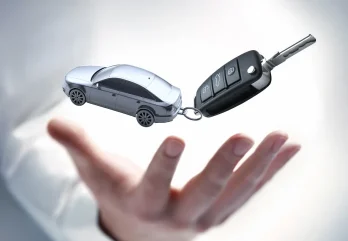
It is hard to knock the convenience of rental. Having a vehicle dropped at your door, often at short notice, is pretty impressive, and plugs the gaps in many a fleet.
Last year, the BVRLA claimed business customers accounted for 58% of car rentals and 82% of van hires, while the sector saved more than 25,000 tonnes of CO2 a year over private vehicles, because rentals are, on average, eight years younger, and the rental EV fleet was up 200% on 2022.
All good news, but the reality of dealing with rental can differ from the headlines. AFP board director, Lee Jackson, operates a 1,300-vehicle fleet, around 150 of which are rentals. He says availability and turnaround times have significantly improved since the worst of the new vehicle shortages, when fleets took a back seat next to more profitable retail sales, and praises hire firms for delivering EVs with 50% charge (although he notes how expensive they are and that drivers would benefit from a brief ‘this is how it works’ on delivery).
However, his “biggest bugbear” is the way in which damage charges are handled: “I’ve had instances of really long reports on damage, highlighting every little scratch, where you can’t see a damn thing in the photo. I’ve even had ultraviolet light checks to show me blemishes and scratches I would never have seen with the naked eye – which didn’t happen when the vehicle was delivered.”
According to Jackson, a recent development is increased scrutiny of van loading areas for dirt and marks: “I’d never seen charges for panels or plylining being dirty, or even marks on interior sills. Challenging loading areas was never really a thing, but it seems to be every opportunity now.”
It is not the first time we have heard such comments from fleet operators, and Jackson’s chief issue is the monetisation of damage charges: “Years ago, another company charged us for a vehicle to be repaired – then the same vehicle came back with the same damage. That’s a company I’ll never use again.
“I appreciate damages occur, and it’s right that the customer is charged for them because it’s an asset. However, to make a revenue stream from it, I think, is a poor practice.”
BVLRA chief executive, Toby Poston, advises fleets to inspect vehicles when they are dropped off and take their own photos. He says fleets should, “expect to see evidence of any damage” and points to the organisation’s alternative dispute resolution (ADR) service, although admits it is mostly used by consumers, because fleet rentals are, “more based on discussions and ongoing relationships”.
In addition to damage charges, fleet managers have previously told Business Car that keys are sometimes posted through employees’ letterboxes minus a delivery signature – allegedly ending up on the wrong doormats in some cases – and that it can be difficult to establish to whom damage is attributable. Another frequent issue is that once a vehicle has been assigned, the driver – not the fleet manager – becomes the main point of contact, so keeping abreast of rentals for reporting purposes can be tricky.
Business Car’s mystery shop
We put rental firms to the test to find out what fleet operators could expect when they contact them. Posing as a Dartford-based fleet manager looking to set up a new contract, we rang the big five firms and asked them a series of questions. For companies with a dedicated business/corporate phone number, we rang that, otherwise, we tried the main, customer-facing number listed on the website where available.
We did not include Alamo, Budget or Dollar, because they are owned by Enterprise, Avis and Hertz respectively and, in our experience, the teams are often the same behind the scenes. Thrifty is owned by Hertz internationally and we did not include it under the belief that the same applied in the UK. However, after this article was first published, it informed us that it operates independently of Hertz in UK, where it is licenced to Scot Group, trading as Switch Car Rental.
We asked the following questions:
Where is our nearest branch?
Will the fuel type/transmission of the vehicle we receive match the one we book?
How is vehicle condition recorded at the start/end of a loan and where does the assessment take place?
What would happen if a vehicle were delivered and no one was available to sign for it?
What’s the maximum age of vehicles you rent to business customers?
Do you supply EVs? If so, is there any particular process involved, such as a guaranteed level of charge on delivery?
Are you able to keep both the driver and the fleet manager informed about the status of the rental? E.g. sending an email with reservation details to both parties?
Can you give us a ballpark daily rental cost for a petrol, manual Volkswagen Golf or closest equivalent?
We based our assessment on the quality of the company’s response. Were they helpful? Were they polite? Could they answer our questions? And did they have a good grasp of their business? Each company we spoke to answered the phone quickly, so speed was not an issue.
1st: Europcar
The best of the bunch by far, because the agent was extremely helpful, friendly, knowledgeable and generous with their time. There was a branch round the corner from our ‘office’ and rates were cheap.
What Europcar told us:
Fuel type and transmission would match the booking; the company uses telematics to monitor vehicles; a walkaround is conducted at the drop-off location; delivery drivers phone ahead and, if no-one is available to receive the vehicle, will ask the customer what to do with the keys; vehicles are estimated to be a maximum of four years old; EVs will arrive fully charged (we double checked that, and were assured they would be); corporate accounts have an online booking portal with full reservation and billing details; a day’s hire was £18.64 with our own fleet insurance, £28.84 with a collision damage waiver and £1,000 excess, and £33.59 with full-coverage/zero excess insurance – all with collection and delivery.
2nd: Hertz
A comfortable second, courtesy of its polite and professional agent. There was also a branch local to us.
What Hertz told us:
Guaranteed match for fuel type and transmission; the company conducts vehicle inspections at the branch – not at the drop-off location; keys will be dropped through the letterbox if nobody is available to receive the vehicle; vehicles are typically up to two years old; it has Polestars and Jeep Avengers on the EV fleet and there was no specific process for hiring them; multiple contact details can be added to reservations, but the branch will only contact the primary phone number; a day’s hire with your own blanket fleet insurance (does not apply registration-specific policies) is £25.61 or £50.39 without. Delivery and collection costs £65 plus VAT each way.
3rd: Enterprise
The agent was pleasant and tried to help, but did not seem well-informed and said several questions would have to be answered by the branch or a corporate account manager after we signed up (they initially directed us to a form on the website for new business accounts). There was a local branch, for which the agent supplied the number.
What Enterprise told us:
Inspections happen at the point of drop-off; vehicles are typically up to three years old; Enterprise’s system can only accommodate one email address; a day’s rental at a retail rate (the agent could not provide us with a business one) is £49.50, including a damage waiver and £1,500 excess.
4th: Avis
The agents (we spoke to two) were amiable, but this did not seem a viable option for our ‘business’.
What Avis told us:
Our local branch had closed (however it’s still listed on Avis’s website and still shown on Google Maps) with the nearest office a 40-minute drive away. Delivery/collection is only available when vehicles are hired for a minimum of 28 days; transmission will match the booking but fuel type may not; inspections happen at the drop-off location; delivery drivers will not drop off a vehicle without someone able to sign for it; vehicles are typically up to a year old; EVs are available and delivered with at least 50% charge; a month’s rental with our own fleet policy is £532.56, with a £1,500-2000 damage/theft excess is £799.68 and with full insurance/zero excess is £1,118.16, all excluding VAT.
5th: Sixt
Try as we might, we could not find a phone number on Sixt’s website. You can fill in a form and wait for someone to respond, but there does not appear to be a facility for budding customers to ring the company. Similarly to Avis, the closest branch to our ‘business’s’ location was a 40-minute drive away.
Alternative rental companies
One of our criteria was that fleets would need to be able to hire cars. That ruled out the likes of Northgate Vehicle Hire and Herd Group, which specialise in commercial vehicles, often on long-term rentals, but if you need vans for longer periods, they are worth a look. Brokers/aggregators, such as Nexus Vehicle Rental, typically pool multiple suppliers for maximum coverage, so customers could well receive vehicles from every company mentioned here and more.
We also examined Green Motion, which has very low prices online – but tread carefully. When we rang, the automated response said, “in order to provide the best and most efficient service, we are asking customers to email us”. Online reports and reviews about Green Motion are not favourable and typically suggest the company undercuts rivals on the headline cost, then applies questionable damage charges.
Finally, do not discount small, independent rental firms. If there is one nearby that meets your requirements, it might offer a more personal level of service than the big boys.





